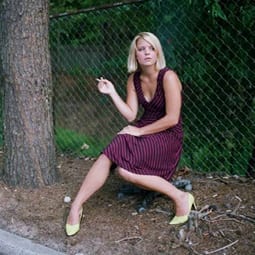
May the Road Rise to Meet You, Sara Macel’s recent book sort of tracks, but ultimately reimagines her father’s experiences as a traveling salesman of telephone poles. Part-documentary and part-performance piece, the project explores, among many things, the ways some men move through life, how daughters watch them as they do, what work means to both, and what photographs will and won’t reveal. Having been lucky enough to watch this project evolve and now that it’s begun to be widely seen, I was glad to have the chance to sit down and talk with Macel about the nature of photographic and personal journeys.
Marvin: Photobooks about fathers and photobooks about road trips seem to be guy terrain. What got you interested in both of these genres?
Sara: I grew up in a house full of women, so the male psyche has always been a bit like an exotic bird to me. It was in college that I got interested in early ‘70s color photography and was drawn to Stephen Shore and Joel Sternfeld because of the road trip thing, which subconsciously probably was related to my dad, but I didn’t really make that connection until years later.
MH: Were you looking at Robert Frank too?
SM: Definitely. For me, there’s a straight line from Walker Evans to Robert Frank to Alec Soth. I remember thinking, when Soth’s Sleeping by the Mississipi came out: What’s the deal with all these guys doing this? Why don’t more women go on the road? And why aren’t more women photographing their fathers? My dad’s story just seemed the most personal way to do both.
MH: When I page through your book, it feels like a movie, and with the blow-ins you’ve included, an interactive one, too.
SM: I was looking at movies like Salesman, the Maysles brothers’ documentary about Bible salesmen, and the Coen brothers’ No Country for Old Men (Funny to think that both those movies were made by brothers.) Some of my photos can look like movie stills or read like a sentence taken out of a short story. The sequencing of the book takes you from place to place and leads you through time with my father, a traveling telephone pole salesman, over the course one business trip that’s meant to represents his whole career.
MH: We’ve talked a lot about fact and fiction in terms of the book, so I thought of you when I read an article that mentioned John Grierson, the first person to use the word documentary to describe films early in the 20th century. He said documentary meant “the creative treatment of actuality.” Where does your project fall on the fact/fiction continuum?
SM: I’ve always shied away from calling this project documentary because it’s so subjective, so much a creation of something my dad and I constructed. Certain shots really were carefully pieced together and other were more off the cuff and in the moment.
MH: Did you review the photographs with your father as you worked on the project?
SM: Not until I made a little mockup of the book about a year in. As much as I wanted him to have a voice and some control over his own image, I don’t think he understood my intentions until he saw the final book. He was expecting it to be a more straightforward document of a salesman. For me, it was just as much about the distance between us and my fantasies of where he went and what that life might’ve looked like.
MH: In this project were you looking at your father as a parent, a man, a peer, or as a guy who landed a curious job and led a certain kind of life? It’s complicated to acknowledge and respect all of that.
SM: At first, we were very much in our father/daughter dynamic and introducing my camera into that felt foreign. I had never photographed him beyond family snapshots. Part of getting in the car with him was to find out who he was when he wasn’t being my dad, to relate to him as a fellow traveler. Some of the images are very much from my point of view, some are me looking at him. Some are very much about me trying to pretend I’m him.
MH: Two themes in the photographs are silence and aloneness.
SM: As much as the book is a story about a man on the road, I think on a very fundamental level we both understood the tone of the project, that it was about loneliness.
MH: The project seems both celebratory and a little bit sad. Is that something anticipated or something that revealed itself as the project went along?
SM: I’ve been told my photos are sad in general. I tend to be nostalgic for a moment as I’m photographing it. For me the very nature of photography is melancholic, as Roland Barthes wrote in Camera Lucida. On some level all photographs are like a little death because the second you take the photo of something, it doesn’t exist anymore.
MH: Looking at one of the final pictures in the book, I’m struck by the picture of your dad sitting on the bed in a Holiday Inn, or what I assume is one because he’s holding a Holiday Inn glass. That image, of an aging man sitting on a bed, seems to get made again and again. Eggleston did it. Larry Sultan made another version of it. Now you have, too. What do you think was going through your father’s mind when you shot that?
SM: He was probably thinking, “Hurry up and take the photo already.” By that point in the project, he was so used to the camera that he was in character, you know? In the sense of, “I’m supposed to be in my travelling salesman persona now.” That particular photo is really much more about me than it is about him. I asked him to sit on the bed and gave him the glass to hold and said, “Just look out the window.” I bought the glass on eBay because of its old Holiday Inn logo, which isn’t used anymore since they’ve rebranded. I wanted the old logo because that is what I remember from when I was a kid and he always stayed at Holiday Inns. My intention was to photograph him sitting on the edge of a bed with a glass of scotch, missing us; that’s the image I had in my head since I was a kid of what he looks like when he’s traveling. To have that opportunity to work with him to make that memory that doesn’t exist anywhere but in my head was a great experience for me.
M: What do you think about now when you see or pass by telephone poles?
S: That I should probably give my dad a call.

